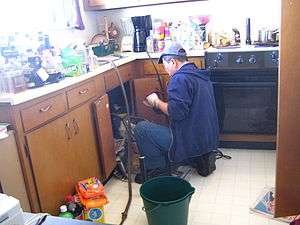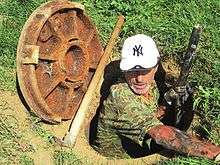Plumber
 Residential plumber at work. | |
| Occupation | |
|---|---|
Occupation type | Vocation |
Activity sectors | Construction |
A plumber is a tradesperson who specializes in installing and maintaining systems used for potable (drinking) water, sewage and drainage in plumbing systems. The term dates from ancient times and is related to the Latin word for lead, "plumbum".[1][2]
History
The word "plumber" dates from the Roman Empire.[3] The Latin for lead is plumbum. Roman roofs used lead in conduits and drain pipes[4] and some were also covered with lead, lead was also used for piping and for making baths.[5] In medieval times anyone who worked with lead was referred to as a plumber as can be seen from an extract of workmen fixing a roof in Westminster Palace and were referred to as plumbers "To Gilbert de Westminster, plumber, working about the roof of the pantry of the little hall, covering it with lead, and about various defects in the roof of the little hall".[6] Thus a person with expertise in working with lead was first known as a Plumbarius which was later shortened to plumber.
Plumbing activities

Years of training and/or experience are needed to become a skilled plumber; some jurisdictions also require that plumbers be licensed.
Some needed skills, interests, and values. Protecting health and welfare of the nation is the top priority of a plumber along with,
- Reading drawings, and specifications to determine layout of water supply, waste, and venting systems
- Detecting faults in plumbing appliances and systems, and correctly diagnosing their causes
- Installing, repairing and maintaining domestic, commercial, and industrial plumbing fixtures and systems
- Locating and marking positions for pipe connections, passage holes, and fixtures in walls and floors
- Measuring, cutting, bending, and threading pipes using hand and power tools or machines
- Joining pipes and fittings together using soldering techniques, compression fittings, threaded fittings, and push-on fittings.
- Testing pipes for leaks using air and water pressure gauges
- Awareness of legal regulations and safety issues
- Ensuring safety standards and building regulations are met.
- Copper Piping
- Hydronic heating system installation and maintenance.
- ADA Compliance
- Potable Water Systems
- Sanitary Waste & Vent
- Plumbing Code Compliance
- Acid Waste
- Grease trap interceptors (install)
- Heating Hot Water
- Chill Water
- Backflow Preventers
- Natural Gas
- Storm Drains
- Seismic
- New Construction
- Urinals (waterless and standard)
- Flush Valves
- Toilet Chair Carriers
- Floor Drains
- Floor Clean Outs
- Combination waste & Vent
- Floor Sinks
- Operate a Plumber's Snake to unclog sanitary sewers & drains.
- Perform a Pipeline Video Inspection of a sanitary sewer or drain.
- Replace Sump Pumps & Install Sump Pit Basins.
United States
Each state and locality may have its own licensing and taxing schemes for plumbers. There is no federal law establishing licenses for plumbers.[7]
Canada
In Canada, licensing requirements differ by province, however the provinces have pooled resources to develop an Interprovincial Program Guide that developed and maintains apprenticeship training standards across all provinces. The result is what is known as the Interprovincial Standards Red Seal Program.
United Kingdom
National Vocational Qualifications (NVQ) remained the main form of plumbing qualification until they were superseded in 2008 by the Qualification and Credit Framework (QCF)[8] and then again into the National qualifications frameworks in the United Kingdom in 2015. The terms NVQ and SVQ (Scottish Vocational Qualification) are still widely used[9].
Plumbers in the United Kingdom are required to pass Level 2 and Level 3 vocational requirements of the City and Guilds of London Institute. There are several regulatory bodies in the United Kingdom providing accredited plumbing qualifications, including City and Guilds of London Institute and Pearson PLC [10].
Australia
Plumbers in Australia have licensing requirements that differ from state to state but it is generally accepted a 4-year apprenticeship with a further minimum experience of 2 years (6 years total) and a further curricular requirement as a benchmark for licensing. Licensed plumbers are also expected to maintain minimum relevant training requirements to maintain their plumbing license
Dangers
Type of Danger
There are many types of dangers to a plumber. Some of them are strains and sprains, cuts and lacerations, bruises and contusions, fractures, burns and scalds, foreign bodies in the eye, and hernias.[11]
Ditch collapse and Holes
On a construction site there are many dangers. Without protective measures, a ditch can collapse on a plumber who is at the bottom of one.[12] A plumber can also fall down a hole.[13]
Acids and Bases
When a person has a blockage in their sewage system they often try to fix it themselves by adding an acid or a base such as Drano in an attempt to dissolve or dislodge the problem. These chemicals can get into the plumbers eyes [14]when the sewage is splashed during the repair. The plumbers skin during the repair does come into contact with the sewage water.[15] The owner of the toilet might not report to the plumber they have already tried Drano a highly caustic base .
Infectious disease risks associated with occupational exposure
Plumbers risk infections[16] when dealing with human waste when repairing sewage systems. Microbes can be excreted in the feces or vomit of the sufferer onto the toilet or sewage pipes. Human waste can contain infectious diseases such as cholera, typhoid, hepatitis, polio, cryptosporidiosis, ascariasis, and schistosomiasis.
Other uses
The term "White House Plumbers" was a popular name given to the covert White House Special Investigations Unit established on July 24, 1971 during the presidency of Richard Nixon. Their job was to plug intelligence "leaks" in the U.S. Government relating to the Vietnam War (i.e. the Pentagon Papers); hence the term "plumbers".[17]
Notable plumbers
- John Braden (politician)
- John Calley (engineer)
- Don Cameron (Victorian politician)
- Frank Courtnay
- B.C. Plumbers
- Thomas Crapper
- Martin Patrick Durkin
- Tom Finney
- Joseph-Achille Francoeur
- Anthony Clark
- Colin Furze
- Leon Griffith
- Albert Einstein was made an honorary member of the Plumbers and Steamfitters Union[18][19]
- Philip Haas (Inventor)
- George Jennings
- Niamh Kindlon
- Leslie McMahon
- George Meany
- Mike O'Mara (politician)
- Shawn Nelson (plumber)
- Harry Patch
- Joe the Plumber – During the 2008 US presidential election campaign, Samuel Joe Wurzelbacher questioned Barack Obama's proposed tax plan. The Republican McCain-Palin campaign later applied "Joe the Plumber" as a metaphor for middle-class Americans.[20]
- William J. Spencer
- Leonard Susskind
- Richard Trethewey
- Alphonse Verville
- Orlando Zapata
- Super Mario – video game character from the game franchise of same name.
See also
References
- ↑ Whitney, William D., ed.. "Trade." Def, 7. The Century Dictionary: An Encyclopedic Lexicon of the English Language vol. 8. New York. The Century Co. 1895. 6,415. Print.
- ↑ Employment and Occupations in the Skilled Trades in Michigan, Michigan Department of Technology, Management, and Budget, Bureau of Labor Market Information and Strategic Initiatives (June 2013).
- ↑ Pulsifer, William H. Notes For a History of Lead, New York University Press, 1888 pp. 132, 158
- ↑ Middleton, The Remains of Ancient Rome, Vol. 2, A & C Black, 1892
- ↑ Historical production and uses of lead. ila-lead.org
- ↑ EW Wedlake; J Britton (1836). "Westminster Palace". The history of the ancient palace and late Houses of Parliament at Westminster. J B Nichols and son. p. 122. Retrieved 28 June 2010.
- ↑ "How to Become a Plumber in the USA". U.S. Bureau of Labor Statistics. 1 November 2016. Retrieved 1 November 2016.
- ↑ "Plumbing Qualifications in the UK". Local Heroes. Retrieved 27 February 2018.
- ↑ "Plumbing Qualifications in the UK". Local Heroes. Retrieved 27 February 2018.
- ↑ "Plumbing Qualifications in the UK". Local Heroes. Retrieved 27 February 2018.
- ↑ "Injuries and Accident Causes in Plumbing Operations" United States Department of Labor. 1949
- ↑ "Plumber Mike Tehle could handle everything from clogged-up pipes to deep sewer lines. But he never planned on being buried alive."
- ↑ "Blue Collar's Death Probed"
- ↑ "Chemical Eye Burns"
- ↑ "Plumber in sulphuric acid burn horror"
- ↑ "Infectious disease risks associated with occupational exposure: a systematic review of the literature"
- ↑ "II. The Plumbers". The Atlantic. Retrieved 17 September 2013.
In the early evening of June 17, 1971, Henry Kissinger held forth in the Oval Office, telling his President, and John Ehrlichman and Bob Haldeman, all about Daniel Ellsberg. Kissinger's comments were recorded, of course, on the hidden White House taping system, and four years later, a portion of that tape was listened to by the Watergate Special Prosecution Force, which was then investigating the internal White House police unit known as the Plumbers.
- ↑ UGC, Chicago Tribune. "13 Plumbing Facts You Probably Didn't Know". chicagotribune.com. Retrieved 2016-04-10.
- ↑ Sagan, Carl (2014-03-14). "Carl Sagan Explains Albert Einstein". New Republic. Retrieved 2016-04-10.
- ↑ "Doubts raised on US 'plumber Joe'". BBC News. 2008-10-17. Retrieved 2008-10-29.
Joe Wurzelbacher, 34, found himself at the center of a media frenzy on Thursday after "Joe the plumber" was mentioned 26 times during the final debate.